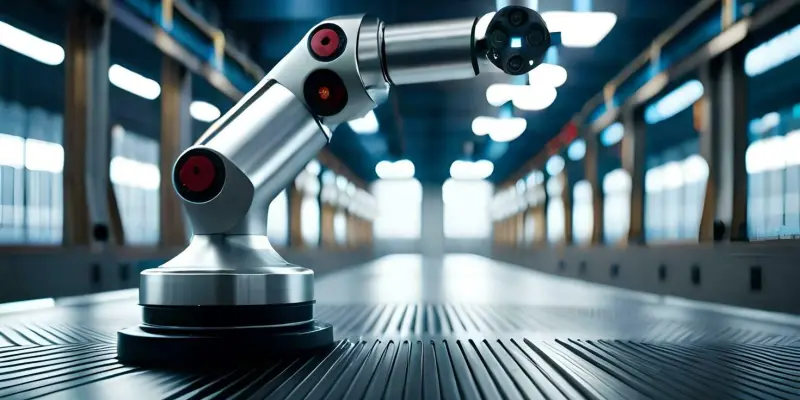The industrial robotics market is anticipated to undergo significant growth in the coming decade, with projections indicating it will reach an impressive $291.1 billion by 2035 from its current valuation of $55.1 billion, according to Future Market Insights. This surge is primarily driven by advancements in automation, artificial intelligence (AI), and the increasing adoption of Industry 4.0 technologies. Sectors such as automotive and electronics are expected to play a dominant role in driving this market expansion. Notably, East Asia is set to experience substantial growth, already accounting for two-thirds of the global market share.
Adoption of Automation Tools
Global labor shortages and escalating consumer demand for quick and efficient product deliveries are pushing companies to increasingly adopt automation tools, particularly industrial robots. The rise of collaborative robots, or cobots, has significantly contributed to this trend. Cobots are designed with advanced safety features that enable them to work alongside human employees without the need for extensive safety measures. This collaboration enhances productivity while ensuring human workers’ safety. Additionally, the rising demand for flexible and customizable robotic solutions tailored to specific production and processing needs continues to drive the market forward.
The need for automation tools arises from the growing complexities in manufacturing and production processes. These robust robotic solutions offer businesses the flexibility to quickly adjust to changing demands and production requirements. Companies are investing in automation to streamline operations, reduce operational costs, and enhance overall efficiency—from assembly lines in automotive plants to intricate procedures in electronics manufacturing. By adopting these advanced automation tools, businesses can maintain a competitive edge in an increasingly fast-paced market environment.
Impact of AI on Industrial Operations
AI-powered robots are revolutionizing industrial operations by incorporating predictive analytics, real-time decision-making, and adaptive learning. These robots are capable of processing and analyzing vast amounts of data to recognize patterns and make autonomous decisions, resulting in optimized workflows. This advanced capability is particularly beneficial in high-tech industries such as electronics, pharmaceuticals, and aerospace, where precision and efficiency are paramount. The integration of AI in industrial robotics not only enhances efficiency but also drives innovation, enabling companies to develop new products and improve existing ones. The advancements in AI technology have transformed how businesses approach production and manufacturing. AI-powered robots can anticipate maintenance needs, identify potential issues before they occur, and autonomously adjust to changes in production processes. This level of sophistication reduces downtime, minimizes errors, and increases overall productivity. Moreover, AI allows companies to harness the power of big data, facilitating more informed decision-making and strategic planning. As AI continues to evolve, its impact on industrial robotics will likely become even more pronounced, driving further enhancements in automation and operational efficiency.
Future Market Insights and Industry 4.0
Nikhil Kaitwade, Associate Vice President at Future Market Insights, highlights the rapid evolution of industrial robotics, emphasizing how automation advancements are enabling businesses to achieve greater efficiency, precision, and adaptability. The continuous improvements in AI, cobots, and flexible automation have ushered industries into a new era of smart manufacturing. This shift has significantly boosted productivity and competitiveness, encouraging businesses to invest in innovative robotic solutions to stay ahead in the global market. The adoption of Industry 4.0 technologies is expected to accelerate the growth of the industrial robotics market, making automation an indispensable aspect for businesses worldwide. The integration of AI and machine learning with traditional manufacturing processes is transforming the industry, leading to smarter and more efficient production methods. Companies are increasingly recognizing the importance of investing in advanced robotic solutions to remain competitive and meet the ever-evolving demands of the market. As a result, the industrial robotics market is likely to witness unprecedented expansion, fundamentally altering the global industrial landscape.
Conclusion: A Necessary Evolution
The industrial robotics market is expected to see substantial growth over the next decade, with predictions suggesting it will soar to an impressive $291.1 billion by 2035, a massive rise from its present worth of $55.1 billion, as per Future Market Insights. This remarkable expansion is largely fueled by advances in automation, artificial intelligence (AI), and the increasing uptake of Industry 4.0 technologies. Key sectors driving this surge include the automotive and electronics industries, which are anticipated to have a significant influence on market trends. Furthermore, East Asia is poised to witness noteworthy growth, already making up two-thirds of the global market share. The region’s dominance can be attributed to its rapid industrialization and technological advancements. Companies in this area are investing heavily in robotics to enhance productivity and remain competitive on the global stage. In summary, with continuous innovations and growing demand across various sectors, the industrial robotics market is set for an impressive transformation.

